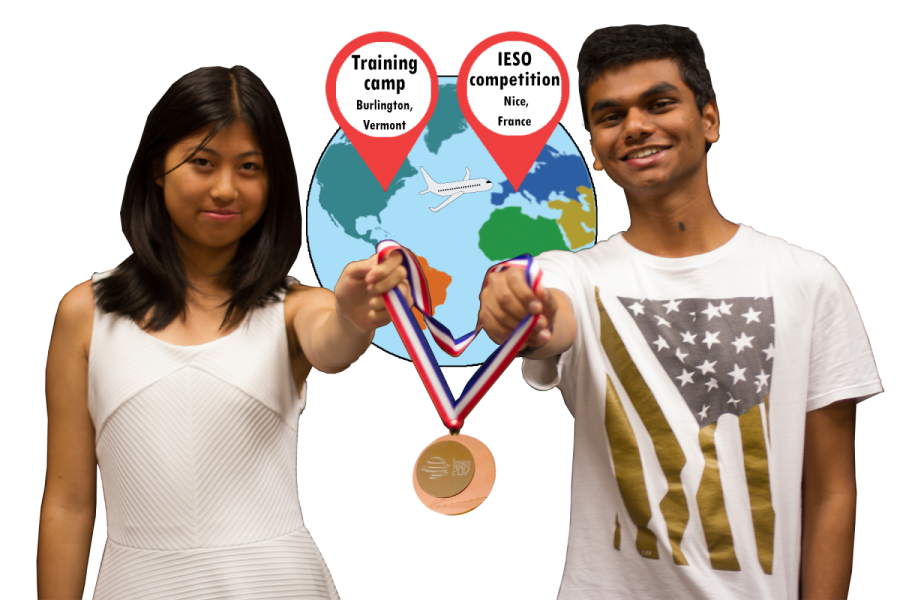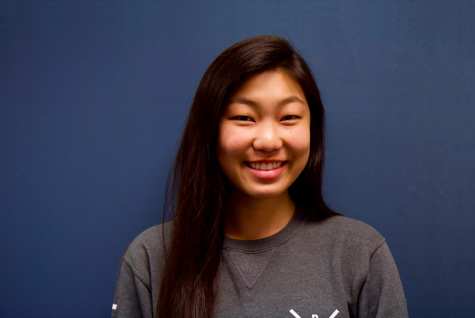Lynbrook students win big at International Earth Science Olympiad
September 28, 2017
Avid learners of the Earth sciences, junior Leslie Pu and senior Abhinav Naikawadi participated in the International Earth Science Olympiad (IESO) in Nice, France from Aug. 22 to Aug. 29 as representatives of the U.S. team. After preparing for countless months, which entailed self-studying with college-level textbooks and attending a national training camp in Vermont, they, along with two other U.S. participants, were able to bring home awards in two of the three events at the competition: a gold medal for their practical examinations and a bronze medal for their theoretical exams.
The international Olympiad tested students’ skills in various areas of the Earth sciences, including meteorology, oceanography, geophysics, geology, terrestrial astronomy and environmental sciences. Students displayed their knowledge and understanding of these sciences by taking practical exams, in which they carried out scientific investigations to reach conclusions about a geological site; theoretical exams, in which they took written tests that covered many topics of the sciences; and interdisciplinary competitions, in which participants applied their knowledge of the Earth sciences to a different field and discussed the ethics behind the activity they were presented with. Each student took two theoretical assessments and four practical exams over a span of multiple days.
“I’m happy with how I did and am proud of myself, especially when considering the [limited] resources I’ve had,” said Pu. “But maybe one thing I could have done better is to not have made myself so nervous because that seemed to negatively impact my performance.”
Science teacher and Science Club adviser Lester Leung was also very pleased with the performance of Pu and Naikawadi, who are both Science Club officers this year.
“I am really proud of them,” said Leung. “Leslie and Abhinav did most of the studying on their own. Since they have participated in science competitions in the past, practicing for those competitions probably prepared them for the IESO as well.”
Regarding the turnout at the competition, more than 130 students from 30 countries participated. In order to qualify for the national team and attend the international Olympiad, these participants had to take a nationwide test in their respective countries. In Pu and Naikawadi’s case, the test was administered in April, and the top 33 performers of that test were taken to a camp in Vermont during June for a week-long selection process that determined the four people who would be on the U.S. team.
“At the camp, there was a professor who led and helped train the U.S. team pretty well for the international Olympiad,” said Naikawadi. “I also prepared for both the national and international Olympiads myself by studying using different geology-based textbooks for different disciplines in geology.”
Throughout the months of studying and delving deep into the Earth sciences, Pu and Naikawadi also came to many realizations, becoming aware of how pressing, important and relevant the Earth sciences are.
“I am now more conscious of what I do because of my increased awareness about pollution and activities that harm the planet,” said Pu. “Also, studying the geology of a region helps me determine where I want to live in the future.”
As for Naikawadi, learning more about the Earth sciences at the moment was fitting for him considering the rolling back of the nation’s environmental agenda.
“It is helpful to consider the Earth sciences, especially with our current political situation drawing back on funding toward the environmental and earth sciences,” said Naikawadi. “I also see why it’s more important, given the impacts global warming has on us. I think the Earth sciences are something we need to focus on more and now I’m definitely considering pursuing that in the future and helping solve issues.”
Having developed a strong passion for the Earth sciences, both Naikawadi and Pu have future plans to incorporate elements of these sciences into their careers. Looking ahead, Naikawadi hopes to base his career off of geophysics or astrophysics, areas of the Earth sciences that most pique his interest. Pu also hopes to incorporate the Earth sciences, along with other branches of sciences, into her career.



































































